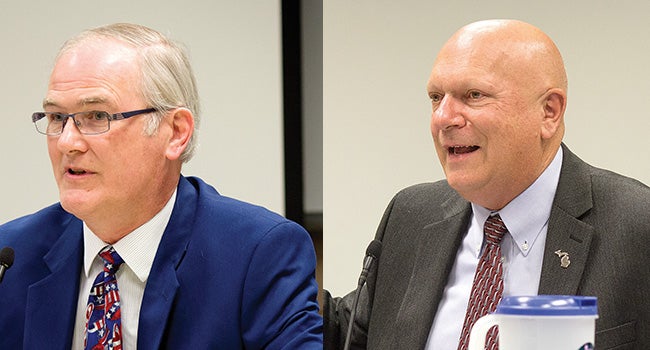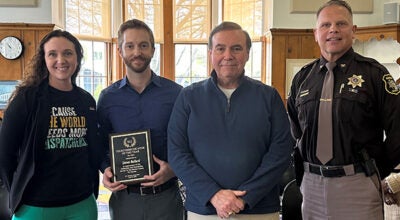Candidates in 78th district race share thoughts on state issues
Published 9:58 am Monday, October 17, 2016

- Dean Hill, Dave Pagel
While 78th District State Rep. Dave Pagel argued that he and other Lansing lawmakers were keeping Michigan heading along the right track, Democratic challenger Dean Hill asked that voters chart a better course for the state as the two faced off in a debate Thursday.
The candidates for the Michigan House of Representatives shared their opinions on several pertinent issues facing the state and the people of Berrien and Cass counties during a forum hosted by the League of Women Voters of Berrien and Cass Counties at the Berrien County RESA building in Berrien Springs.
Pagel, of Berrien Springs, and Hill, of Niles, were joined by the candidates running for the state’s 79th District seat during the forum, fielding questions from moderator Ted Hartzell as well as from members of the audience.
The 78th District encompasses a large portion of Berrien County, including the cities of Niles and Buchanan as well as Niles, Buchanan and Bertrand townships.
The office also represents residents in parts of Cass County, including Howard, Milton, Silver Creek and Ontwa townships.
Pagel, the owner Dave Pagel Farms and Produce, has served as the 78th District Representative since 2012. A former chairman of the Berrien County Board of Commissioners and a previous president of the Berrien Springs school board, the lawmaker is running for his third and final term in the state house.
Pagel was optimistic in his characterization of the Great Lakes State during his opening remarks Thursday, saying that in recent years the state unemployment rate has fallen and is now leading the country in the creation of new manufacturing jobs.
“Things are on the move forward in Michigan, and we can keep that forward momentum going by electing Republicans to office,” Pagel said.
Hill, an art teacher at Dowagiac Union High School, is running for political office for the first time, he said. The teacher is a longtime member of the Michigan Education Association and has represented the high school faculty in labor negotiations in the past, he said.
In contrast to his opponent, Hill said that in the nearly 30 years that Republicans have dominated Lansing the state has suffered, with massive losses in manufacturing, giant cuts to education spending and gradual decline of the statewide population.
“I would like the people to considering voting for Democrats, so we can get out of this malaise we are in terms of our income and the increase of people living in poverty,” Hill said.
Education was a popular topic of debate during the forum, with the moderator and audiences posing several questions related to the topic throughout the evening.
Among these questions asked the candidates about whether the more than 300 private charter schools in operation across Michigan should receive public funding.
Hill was critical of the idea of these for-profit schools, saying that they often preyed on families living in poor communities and that students enrolled in them often perform no differently than those enrolled in public institutions. The teacher was also skeptical of the state using emergency managers to oversee communities with failing school districts, he said.
“Why doesn’t the state work with that district before they try and take over,” Hill said. “Let them find out what is going wrong, what is going bad. … All I have seen them [emergency managers] do is turn things into charter schools and close districts down.”
Pagel was less critical of the idea of private schooling, though he said he believed that they needed to be closely monitored like public school districts.
“Charters have brought some good changes to Michigan, and they have been problematic somewhat,” he said. “I insist on holding them accountable.”
The two found common ground when asked about the recently enacted legislation that will require students to be held back if not up to sufficient reading levels by third grade. While Pagel praised portions of the new law that focused on identifying poor readers early and giving them added assistance, he said that he personally held up the bill in the House of Representatives due to the mandatory retention portion of the legislation.
“This just didn’t make sense, that the state somehow knows better than the teachers or families,” he said. “Some kids might learn to read in fourth grade or fifth or sixth. They might catch up slowly but some of them do. That is a very personal, local decision that should not be mandated.”
Due to his opposition, the bill was amended to put off any state mandated grade retention for another two years, Pagel said.
Hill also opposed the idea of holding struggling readers back, though he said that due to provisions like teachers being able to recommend students move on if they perform strongly in other subjects, some of his concerns about the legislation were assuaged.
The candidates were also asked to weigh in on the Berrien County commissioners’ decision earlier that day to create a public defender’s office to represent indigent clients in the county court system, and whether or not they would advocate for the creation of similar offices in other counties across the state if elected.
While he said he supported the legislature’s actions in recent years to raise the standard of public defense for impoverished defendants, Pagel was opposed to the creation of the Michigan Indigent Defense Commission, the division that enforces those new guidelines, saying that it was a “big government approach” to the issue. The lawmaker expressed similar reservations about Lansing creating public defender offices in state counties, saying it should be a decision made at the local level.
Hill, on the other hand, was supportive of the idea, saying that he has spoken to many former students over the years who said they did not receive proper legal counsel when they ran into trouble with the law.
“An office like this will hopefully help some of these kids get help,” Hill said. “They do not have to plead guilty just to get a lesser charge. They can plead not guilty and have the system find out whether they are guilty or not instead of walking right into jail.”






